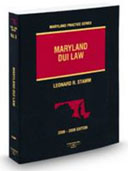Once a driver has been arrested for a DUI or DWI in Maryland by state, not federal, police, the arresting officer is required to read a form to the driver, called the DR-15 Form. This form explains the penalties for failing or refusing a breath or blood test. Of course if the driver passes the test, i.e. produces a result below .08, there is no penalty. Unfortunately, very few people have even the foggiest clue of what they will blow.
The penalty for failing the test is a 45 day suspension on a first offense or a 90 day suspension on a second or subsequent offense if the driver blows .08 or higher but less than .15. If it is a first offense within five years the driver may be eligible for work, school, medical, or alcohol education restricted driving privileges. If it is a second offense within five years the driver may only obtain a restriction allowing the driver to drive only vehicles equipped with an ignition interlock system.
If the driver blows .15 or higher the penalty is a 90 day suspension on a first offense or a 180 day suspension on a second or subsequent offense. In lieu of the suspension, the driver may be allowed to drive with an ignition interlock restriction for one year.
If the driver refuses the the penalties are a 120 day suspension for a first offense and a one year suspension for a second or subsequent offense. Again, the driver may be allowed to drive with an ignition interlock restriction for one year. A refusal may also be considered as evidence of guilt in court and may also subject the offender to an additional 60 days in jail.
When deciding whether to blow or not, the consequences in court must be considered. Generally, in Maryland state court, a first offender can obtain a probation before judgment (no conviction and no points), if found guilty. An exception to this rule can be in serious accident cases and cases with extremely high test results. Given that general rule, a first offender is usually better off submitting to a breath test since the penalties in court will be tolerable irrespective of the result.
However, if the driver has had a prior DUI within the previous ten years, probation before judgment is not possible and a breath test makes it more likely that the driver will be convicted of the higher level DUI offense, driving under the influence of alcohol, which carries up to a year in jail and/or a $1,000 fine for a first conviction. In these cases, refusal is often the wiser choice, taking an ignition interlock on the car, and enhancing the chances of winning or reducing the case in court.
There are exceptions to this rule though, such as where the driver has a CDL (commercial driver’s license). Each case must be considered on its own facts and circumstances and a hopefully intelligent, if less than sober decision made.
If you are facing serious traffic charges in Maryland and you have a CDL call Leonard R. Stamm or Johanna Leshner of Goldstein & Stamm, P.A. at 301-345-0122 for a free consultation.
Leonard R. Stamm
Goldstein & Stamm, P.A.
6301 Ivy Lane, Suite 504
Greenbelt, Maryland 20770
www.lstamm.com
301-345-0122
(fax) 301-441-4652
Author: West’s Maryland DUI Law

 Maryland DUI Lawyer Blog
Maryland DUI Lawyer Blog

